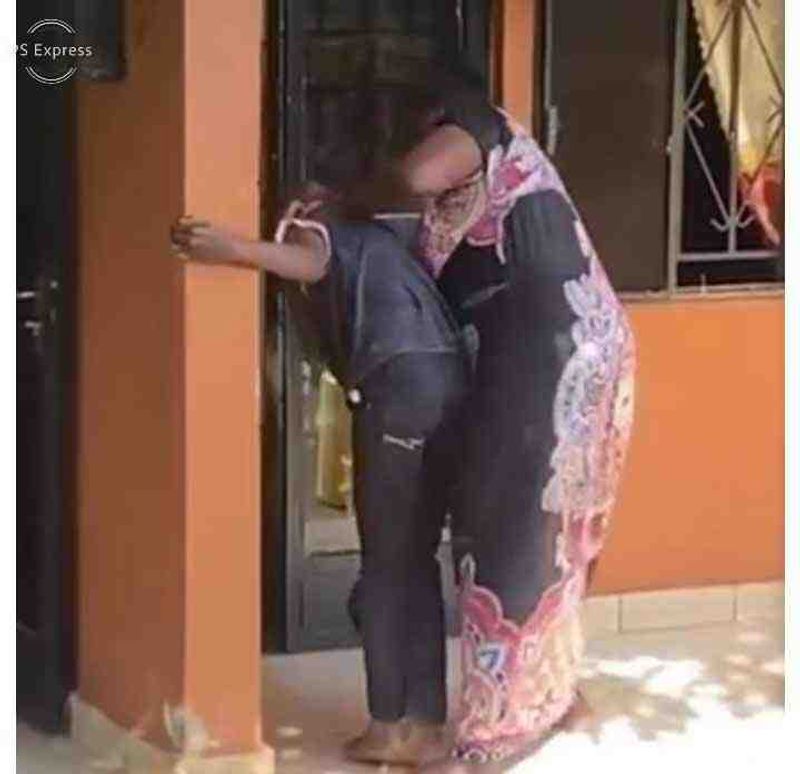

Apolot assaulted her son Omiat, and has attracted criminal charges and condemnation from many people
Move comes after two separate incidents involving death of a child at the hands of a step mother
Child rights activists have called on government to extend the enforcement of the ban on corporal punishment right up the to their homes.
The call by activists under their umbrella body, the Uganda Child Rights NGO network comes amid reports of rising cases of violence in homes involving children.
In two separate incidents, a four year old child was killed by her step mother, while another was severely beaten by her mother for losing UGX5000.
Police reported that it was investigating a case of suspected murder of one Sserubiri Train, a 4-year-old, male juvenile, by the step-mother Asiimwe Honest residents of Kyengera Town Council, Wakiso District. The deceased was living with her father and stepmother after his father separated with his mother two years. The victim’s body had scars on the face and the stomach.
In another incident captured by the police arrested Deborah Apolot, a resident of Kisasi Kanisa zone in Kampala for allegedly assaulting her 10-year-old son Mark Omiat.
Apolot told Police that on Monday May 9, she gave Omiat, her son UGX 5,000 to buy groceries at the shop, but the boy didn’t return home.
She then searched for the child and after finding him, brought him back home and assaulted him.
Apolot’s military methods were captured and posted by some concerned citizen, and has attracted widespread condemnation.
According to a 2021 report from Joining Forces for Africa, entitled; “Protecting children during the COVID-19 crisis and beyond”, 61.4% of children had experienced physical or psychological aggression from guardians in the month of October to November, 2020.
Statistics from the Uganda Child HelpLine (UCHL) for the period 2020-2021, showed physical violence as one of the most reported forms of violence.
In a joint statement, the activists advocating for child protection say that physical violence such as slapping, beating and kicking remain the normal mode of ‘discipline’ in many homes while corporal punishment is still practiced in schools despite being banned by law.
Condemning such violence against children, Damon Wamara the Executive Director Uganda Child Rights NGO Network says that it has dire consequences on the lives of children, including death and physical maiming.

Damon Wamara
Wamara calls on government to ensure the ban for corporal punishment is not only extended beyond schools but is also monitored and enforced.
“As CSOs, we are asking government to fast-truck the amendment of the children’s act to provide for a ban on corporal punishment in all settings. Currently it’s only banned in institutions but we are asking that in every space where a child shall be or is going to be then they need to be protected from any form of corporal punishment, please mark my word Corporal punishment not punishments.”
Wamara clarified that the CSOs are not against disciplining children or issues around raising children well but parents and caregivers should use their hands to nurture, support, and guide children instead of using them for violence.
Discipline in its sense is never supposed to be an act of violence that causes damage to the child.
He goes on to explain that parents and caregivers should draw a line between when they are disciplining and when they are causing violence to the child.
“In reference to the video that has been going around on social media, when you try to discipline a child, when you are very angry, when you are not in your moods, you can end up causing more harm to the child…but you need to take time away, relax think through help the child understand why you are going to discipline the child, help the child understand what they did was wrong, because punishment is supposed to correct not harm,” said Wamara.
On this note, the network further called upon government and development partners to popularise the National Parenting Guidelines nationally and at community level.
They also asked the government to encourage the use of positive discipline in homes, institutions and school settings
Secondly the Government should strengthen child protection structures at all levels including the recruitment and adequate facilitation of Probation and Social Welfare officers (PSWOs) at the district and sub county levels. 20% of districts still don’t have PSWOs in place and those that have are not well resourced.
“We are calling upon the government to ensure that every district, every community right up to the parish and village level, the representation of children is provided for and is well facilitated. We need to have probation officers in every district and to empower them to follow up on cases of violence against children,” Wamara concluded.
Writer Solomon Lubambula can be reached on slubambula@gmail.com














Solomon Lubambula
Leave a Comment
Your email address will not be published.